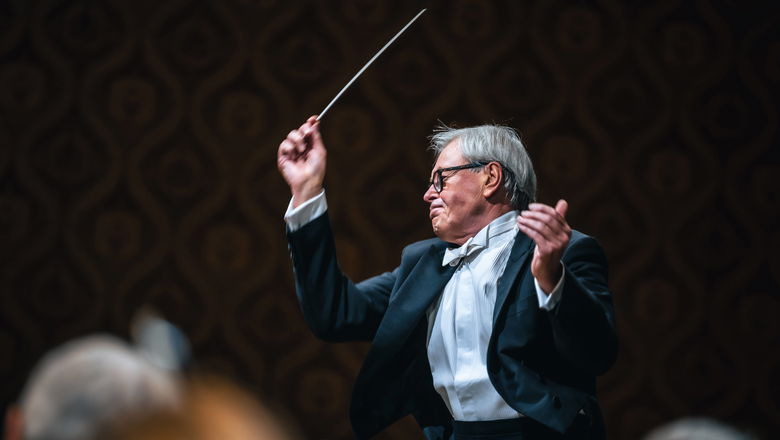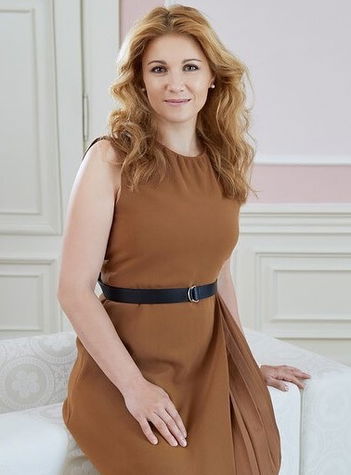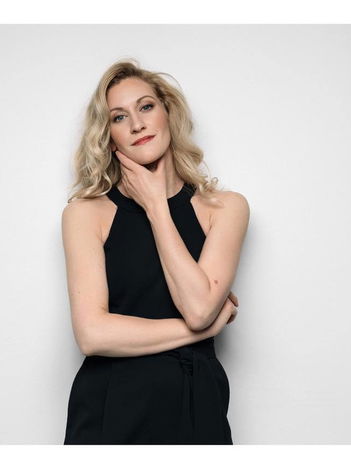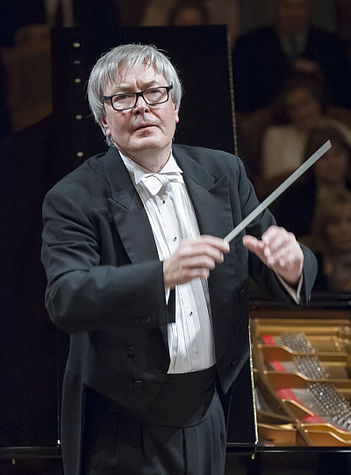1 / 6
Czech Philharmonic • Open Air Concert
The Czech Philharmonic’s Open Air Concert on Hradčaný Square is the traditional conclusion of the concert season, and admission is free for everyone. The programme devoted to the Year of Czech Music is being prepared by Petr Altrichter, who will get the public dancing and singing along with the orchestra and an outstanding vocal trio.
Programme
Antonín Dvořák
Festival March, Op. 54a (6')
Slavonic Dance No. 7 in C minor, Op. 46 (3')
Rondo for Violoncello and Orchestra G minor, Op. 94 (8')
Infernal Dance from Act II of the opera The Devil and Kate (4')
“Od dětství ku oltáři” (“From childhood to the altar”), Ludmila’s aria from the oratorio Saint Ludmila (4')
Antonín Dvořák / arranged by Jiří Teml
“Když mne stará matka” (“Songs my mother taught me”), song from the cycle Gypsy Melodies, Op. 55 (2')
Zdeněk Fibich
Poem from the idyll At Twilight, Op. 39 (5')
Bedřich Smetana
“A ty mé robě” (“And you, my baby”), lullaby from Act I of the opera The Kiss (4')
“Já ale zůstanu” (“But I shall remain”), Přemysl’s aria from Act II of the opera Libuše (3')
Furiant from Act II of the opera The Bartered Bride (2')
Vítězslav Novák
The Country Musicians, movement IV of the Moravian-Slovak Suite for small orchestra, Op. 32 (4')
Antonín Dvořák
“Jářku, jářku, klouče milé…” (“Tell me, dear boy…”), duet of the Gamekeeper and the Kitchen Boy from Act II of the opera Rusalka (4')
Performers
Kateřina Kněžíková soprano
Arnheiður Eiríksdóttir mezzo-soprano
Jiří Brückler baritone
Vilém Vlček cello
Petr Altrichter conductor
Marek Eben host
Czech Philharmonic

Admission to this event is free.
"Czech Philharmonic in the heart of Prague for the Year of Czech Music - it's a great celebration! The beauty, lyricism and depth, the sublimity and wit of our music - may something of all this remain in us! Come and hear!
You are cordially invited."
— Petr Altrichter
The Open Air Concert is open to all audience members free of charge, public seating is mostly standing room only (there will be last rows available for the public within the seating section, please give priority to those who really need to sit).
You can come from both Neruda Street and Pohořelec Street, we will keep the square area passable around the edges. For the first time, the stage will be located near Prague Castle, and it will be possible to watch the concert on a large screen in the upper part of Hradčany Square.
In case of sudden rain, we reserve the right to interrupt the concert. But fingers crossed - everything will go through to the end!
Performers
Kateřina Kněžíková soprano

Soprano Kateřina Kněžíková is one of today’s most promising singers. Besides performing opera, she is increasingly devoting herself to the concert repertoire, collaborating with such ensembles as the BBC Symphony Orchestra, the Bamberg Symphony, the Camerata Salzburg, or the Orchestra dellʼAccademia Nazionale di Santa Cecilia. Her core repertoire consists of works by Dvořák, Martinů, and Janáček and the song repertoire. She is a laureate of several vocal competitions and was honoured at the 2018 Classic Prague Awards for the best chamber music performance. She earned a Thalia Award for her outstanding performance in Julietta (Martinů) on the stage of the National Moravian-Silesian Theatre.
In 2006 she became a full-time opera ensemble member at the National Theatre, where she is now appearing in many productions including Rusalka, Così fan tutte, Carmen, The Magic Flute, The Bartered Bride, and The Jacobin. Nonetheless, she sees one of her greatest successes as having been the title role in Káťa Kabanová at the Glyndebourne Opera Festival in 2021.
Arnheiður Eiríksdóttir mezzo-soprano

Arnheiður Eiríksdóttir is a soloist of the National Theatre Opera in Prague from the 2020/21 season. Last season she has appeared here as Rosina (Il barbiere di Siviglia), Varvara (Katya Kabanova), Octavian (Der Rosenkavalier), Cherubino (Le nozze di Figaro), Dorabella (Così fan tutte), Kitchen Boy (Rusalka), Stéphano (Roméo et Juliette) and Mercédès (Carmen). In March 2023 she has performed the role of Suzuki (Madame Butterfly) at the Icelandic Opera in Reykjavík.
From 2018 to 2020, Arnheiður Eiríksdóttir was member of the international opera studio at the Oper Köln, where she performed Carlotta in Salieri’s La scuola de’gelosi, Saint Margarete in Braunfels’ Szenen aus dem Leben der Heiligen Johanna, Jennie Hildebrand in Weill’s Street Scene, Death in Stravinsky’s The Nightingale, Muse/Nicklausse) in Hoffmanns Erzählungen für Kinder, Glückskind in Hanke’s Der Teufel mit den drei goldenen Haaren, as well as the role of Mercédès in Carmen. She guest appeared as Kitchen Boy (Rusalka) at the Cologne Opera House.
After completing her Diploma with honors from the Reykjavík College of Music Arnheiður honed her skills in the University of Music and Performing Arts in Vienna under the guidance of Sebastian Vittucci, Christoph Ulrich Meier and Reto Nickler. Already during her studies she had the opportunity to sing Cherubino, Meg Page in Verdi’s Falstaff and Andronico in Händel’s Tamerlano in Schlosstheater Schönbrunn, as well as Dorabella at the Daegu Opera House in South Korea and Hänsel (Hänsel und Grete) with the Icelandic Opera. Arnheiður made her Prague debut at a concert held by Nachtigall Artists on 21 May 2018 at the New Town Hall.
Jiří Brückler baritone

A winner of the National Theatre’s Prize for Artists up to Age 35, Jiří Brückler is admired for his “unique voice, in which we hear lyrical warmth with a shade of melancholy and steely power with dramatic potential”. He studied singing at the Prague Conservatoire under the guidance of Jiří Kotouč and at the Academy of Performing Arts in Prague under Roman Janál. He is a winner of the Antonín Dvořák International Singing Competition in Karlovy Vary in the Junior Category.
At the Opera of the National Theatre and the State Opera, where he has been under engagement since 2012, he has performed key roles in operas ranging from Mozart to Britten. For the role of Rodrigo in Verdi’s Don Carlo, he was nominated for the 2013 Thalia Award. He had already been nominated for that prestigious honour four years earlier for the role of Silvio in Leoncavallo’s Pagliacci as a guest at the F. X. Šalda Theatre in Liberec; later, he sang that role at the Český Krumlov International Music Festival alongside José Cura. He is a regular guest at the J. K. Tyl Theatre in Pilsen, the National Theatre in Brno, and the Bulgarian Opera in Sofia. He also appears in the concert repertoire, collaborating with the leading Czech orchestras.
Petr Altrichter conductor

Petr Altrichter is one of the most distinguished Czech conductors, and he has earned an illustrious reputation for the dynamism and depth of his interpretations of symphonic music. He was raised in a musical family and played musical instruments from a young age. Having graduated from the Conservatory in Ostrava as a French horn player and conductor, he continued his studies at the Janáček Academy of the Performing Arts in Brno in orchestral conducting under Otakar Trhlík and František Jílek and choral conducting with Josef Veselka and Lubomír Mátl. After completing his studies in Brno, he worked as a choirmaster and conductor with the Brno Academic Choir, and contributed to the winning of many prizes at foreign choral competitions and festivals (Middlesbrough, Debrecen…).
Altrichter attracted international attention in 1976, when he won second prize and a special prize of the jury at the renowned International Conducting Competition in Besançon, France. Based on this achievement he began to work with the Czech Philharmonic Orchestra as an assistant of Václav Neumann, which started his artistic career. Not long after that, he began to receive invitations to conduct orchestras abroad. After working with the Brno Philharmonic Orchestra, in 1988 he became the principal guest conductor of the Prague Symphony Orchestra and in 1991 he was appointed its chief conductor. With that orchestra, he made frequent foreign tours to Japan, the USA, Switzerland, Germany, France, and other countries. At the same time he also closely collaborated with the Chamber Philharmonic Orchestra Pardubice, with which he often gave performances abroad introducing many gifted young soloists (such as Isabelle van Keulen and Radek Baborák).
From 1993 to 2004 he also worked as the Music Director of the Südwestdeutsche Philharmonie in Constance, Germany, with which he gave concerts regularly at the Tonhalle in Zurich and at the KKL in Lucerne, and also toured Switzerland and Italy. Having made his U.K. debut with the Prague Symphony Orchestra at the Edinburgh Festival in 1990, Petr Altrichter made his London debut with the English Chamber Orchestra 1993. He then conducted the Royal Liverpool Philharmonic Orchestra in 1994 to a great critical acclaim. He was subsequently appointed its Principal Conductor, a post he held from 1997 until 2001. With this orchestra he appeared at the 2000 BBC Proms at the Royal Albert Hall and made several highly-praised recordings on the orchestra’s own label, RLPO live.
In 2001 Altrichter was invited to become the Chief Conductor of the Brno Philharmonic Orchestra, and he remained there for seven years, returning to the orchestra with which he had been associated since his student days and which he continues to guest conduct up to this day. He is also a regular guest of the Czech Philharmonic Orchestra, with which he has maintained a steady artistic relationship since his beginnings there as an assistant conductor, and of the Prague Symphony Orchestra, the Brno Philharmonic Orchestra, and the Slovak Philharmonic Orchestra, with which he recorded an award-winning CD with Antonín Dvořák’s music. Since the 2018/2019 season, he has been a permanent guest conductor of the Slovak Philharmonic Orchestra, with whom he has been working for many years.
In 2015 he toured Germany with the Czech Philharmonic Orchestra, and in late 2015 and early 2016, he toured China with the same orchestra. At the beginning of the 2017/2018 season, he conducted the Czech Philharmonic at the Dvořák Prague International Festival and later toured very successfully in South Korea, Japan and Taiwan with the same orchestra. In the spring of 2017 he toured Japan with the Prague Symphony Orchestra. In 2018 he toured the United Kingdom with the Czech National Symphony Orchestra. In May 2019 he will be touring with the Czech Philharmonic in China.
Altrichter has appeared as a guest conductor with many leading international orchestras, including Japan’s NHK Symphony Orchestra and the Berlin Symphony Orchestra. In the United Kingdom he has collaborated with the BBC Symphony Orchestra, the Royal Scottish National Orchestra, the BBC Scottish Symphony Orchestra, and the London Philharmonic Orchestra. The orchestras he has guest conducted also include the Bruckner Orchestra in Linz, the Warsaw Philharmonic Orchestra, the Krakow Philharmonic Orchestra, the Southwest German Radio Symphony Orchestra in Baden-Baden, the Latvian National Symphony Orchestra in Riga, the Gran Canaria Philharmonic Orchestra, the Luxembourg Philharmonic Orchestra, the Netherlands Philharmonic Orchestra, the Stavanger Symphony Orchestra, the Norrköping Symphony Orchestra, the Royal Danish Orchestra in Copenhagen and the Odense Symphony Orchestra.
He is a frequent guest at festivals such as Prague Spring, Janáček May in Ostrava, Smetana’s Litomyšl, Moravian Autumn in Brno, and the Bratislava Music Festival. He has made guest appearances at major festivals in Salzburg, Edinburgh, Avignon, Athens, Cheltenham, Paris, Madrid, Chicago, Zurich, Lucerne, Seville, Palermo, and elsewhere.
The bulk of Petr Altrichter’s repertoire consists of Czech music (Bedřich Smetana, Antonín Dvořák, Leoš Janáček, and Bohuslav Martinů), Russian music (especially Dmitri Shostakovich), and the works of Gustav Mahler and Anton Bruckner. Outstanding soloists and performers from around the world (Garrick Ohlsson, John Lill, Tabea Zimmermann and others) value his flexibility in leading orchestral accompaniments, and they seek out collaboration with him.
Compositions
Antonín Dvořák
Selections
The year 1879 began joyously for the 37-year-old Antonín Dvořák. In January he was honoured by a visit from his benefactor the composer Johannes Brahms, in March he received a state stipend for a fifth time, and the Prague public heard the premiere of his Sixth Symphony. A month later, he took part in celebrations of the silver wedding anniversary of Emperor Franz Joseph I and Empress Elisabeth of Bavaria, known as Sissi. At the time, the whole monarchy was in a state of excitement: plans were made for parades, allegorical floats, speeches... The imperial couple was also supposed to visit Prague, so the management of the Provisional Theatre decided to perform Shakespeare’s Midsummer Night’s Dream with incidental music by Felix Mendelssohn Bartholdy for the occasion. Dvořák, whose career had finally begun to develop promisingly at the time, was entrusted with writing a Festival March (later designated as his Op. 54, B88) as an introduction to the performance. The following day, there were celebratory worship services at churches all over Prague, including St Vitus’s Cathedral and the Týn Church. The poor were not overlooked, receiving the gifts of a silver gulden and a ticket to the New Czech Theatre in the Prague suburb Vinohrady, where Tyl’s fairy tale George’s Vision was performed for them. The newspaper Národní listy reported on the event in detail, stating that, among other things, at a public kitchen in Prague’s Lesser Town, 250 poor guests received “a delicious lunch and two litres of beer”. According to the newspaper, the guests were “students, teachers in training, and intelligent people in general who just had the misfortune of being very poor…” Dvořák’s brilliant march has not been forgotten. It was first recorded in 1943 by the Czech Philharmonic with the conductor Karel Šejna, and since then it has been recorded 13 more times, mostly by Czech orchestras.
Besides writing exalted music, Antonín Dvořák could also create melodies as simple as the flowers of the meadow or as earthy as a village dance. One example of this is the first series of Slavonic Dances, Op. 46, B83. Composing them supposedly went so easily that writing out the first draft took just a few hours. Along with the original work for piano four-hands, there is an orchestra version, which was recorded by the Czech Philharmonic in 1935 with Václav Talich. The Slavonic No. 7 in C minor was premiered in December 1878 in Dresden.
Undoubtedly, one of Dvořák’s most touching songs is Když mne stará matka (Songs My Mother Taught Me) from the cycle Gypsy Melodies, Op. 55, B104, to a text by Adolf Heyduk. To this music of great depth and warmth of feeling, Dvořák lent a special quality through a rhythmic contrast: while the vocal line flows along in 2/4 time, the lilting piano accompaniment is written in 6/8 time. When the composer wrote the cycle in 1880, he did not realise that the text would soon have added meaning for him personally—his mother Anna died in December 1882.
In 1884, a festival in the English city Leeds commissioned Dvořák to compose a work on a Biblical subject, but the composer stubbornly insisted on a topic from Czech history, and he got his way. The oratorio Saint Ludmila, op. 71, B144, based on a text by Jaroslav Vrchlický, lasts over two hours. Dvořák worked on composing it for eight months with such intensity of effort that those close to him feared for his life. In the end, physical and mental exhaustion led to fits of agoraphobia, from which Dvořák suffered for the rest of life.
The work’s premiere, warmly received by the English public, was led by the composer himself on 15 October 1886 in Leeds, and the following year Dvořák also conducted the first Czech performance at Prague’s National Theatre, where the important Czech soprano Marie Sittová (1852–1907) sang the part of Saint Ludmila. The aria “From childhood to the altar” is heard in Part I of the work, when Ludmila is visited at Mělník Castle by the hermit Ivan, who preaches the Gospel to her. The oratorio reaches its climax with the baptism of Ludmila and Bořivoj at Velehrad by Bishop Methodius.
“So you’re going to America? Watch out, my dear friend! Everything there is four times more expensive than in our country, and the demands they are making on you are considerable… I am warning you to be careful in your own interest!” wrote Dvořák’s publisher Fritz Simrock in early 1892. By then, however, the composer had firmly made up his mind, and preparations were fully underway for his departure for New York, where he was to become the director of the National Conservatory of Music. Those preparations included a farewell concert tour of Bohemian and Moravian towns, on which he was accompanied by his friends the violinist Ferdinand Lachner and the cellist Hanuš Wihan. For the tour, Dvořák wrote a new work, the Rondo in G minor, Op. 94, B181, in which a tinge of melancholy, like a foretaste of his feelings of separation from his homeland, is wed to the composer’s intrinsic optimism. They played the work together in early January 1892 in Rakovník and Chrudim. There is also a later arrangement for chamber orchestra.
In 1898, Dvořák and his wife Anna celebrated their silver wedding anniversary, and their daughter Otilie married Dvořák’s student Josef Suk. Dvořák also decided that from then on, he would only compose operas: “I’m working on what I want, and not what others want”, he wrote in a letter affirming his change of creative direction. Dvořák’s first opera from this period is The Devil and Kate, Op. 112, B201, in which he took full advantage of the story’s comedic and fanciful character. His music wonderfully depicts various settings, and because the main character, the cheeky girl Kate, likes to dance, Dvořák naturally included stylisations of dances: the waltz, the polka, the polonaise, and even a devilish Infernal Dance in Act II.
Another opera based on a fairy tale is Rusalka, which the Czech Philharmonic’s former chief conductor Jiří Bělohlávek called the “queen of Dvořák’s operas”. The role of Rusalka was first sung by Růžena Maturová. Appearing as the Gamekeeper at the premiere on 31 March 1901 at Prague’s National Theatre was Adolf Krössing (1848–1933), who was especially celebrated as Vašek in Smetana’s Bartered Bride (Smetana also wrote the roles of Skřivánek in The Secret and Michálek in The Devil’s Wall for him). Vilemína Hájková (1872–1944), known for her vocal and theatrical versatility, sang the part of the Kitchen Boy.
Zdeněk Fibich
Poem from the idyll At Twilight, Op. 39
Whenever Zdeněk Fibich wanted to stimulate his imagination, he would read stories by E. T. A. Hofmann, but he did not need to do so when he wrote the composition Poème. Although married, he fell hopelessly in love with his pupil Anežka Schulzová. His junior by nearly 20 years, she was the daughter of the journalist and politician Ferdinand Schulz, and she became Fibich’s muse. In 1892, she inspired him to begin keeping a musical diary of their love affair, the piano cycle Moods, Impressions and Souvenirs, consisting of an incredible total of 376 little pieces. Number 139 (Evenings at Žofín Palace, Op. 41, No. 6,) depicts the awakening of their love in symbiosis with the atmosphere of nature in springtime. Fibich took the brief but pianistically challenging piece and arranged it for orchestra as an idyll titled V podvečer (In the Evening), Op. 39, then 1901 the Czech violinist Jan Kubelík made the piece world famous under the title Poème.
Bedřich Smetana
Selections
Bedřich Smetana’s operas The Kiss, JB 1:104, and The Bartered Bride, JB 1:100, are the most frequently performed Czech operas after Dvořák’s Rusalka. One of the most attractive moments in Act I of The Kiss (1876) is when Vendulka, having quarrelled over a kiss with her sweetheart the widower Lukáš, sings a lullaby to his child. A popular number from The Bartered Bride (1866) is a stylisation of the furiant, a Czech dance with a characteristic alternation of duple and triple metre.
The opera Libuše, JB 1:102, has remained an exceptional work since its premiere for the opening of the National Theatre in 1881 and its performance for the theatre’s reopening in 1883. Incidentally, this is what the composer himself wanted, declaring: “I ask that Libuše not be put into the repertoire, but that it be reserved as a festive work for days of special commemoration.” The aria “Já ale zůstanu” (“I, however, shall remain”) from Act II introduces us to Přemysl as he reminisces about Libuše, whom he has known since childhood according to this version of the legend. At the same time, his words are addressed to linden trees, a symbol of his Bohemian homeland. At the premiere, the role of Přemysl was entrusted to the baritone Josef Lev (1832–1898), who was a friend of both Dvořák and Smetana, and who also had close ties to the writer Jan Neruda.
Vítězslav Novák
The Country Musicians, movement IV of the Moravian-Slovak Suite for small orchestra, Op. 32
The conductor Václav Talich fittingly described Vítězslav Novák, one of Antonín Dvořák’s pupils, as “the greatest landscape artists of Czech music”, referring mainly to the composer’s creative period in the early 20th century, when Novák not only made use of his knowledge of Moravian and Slovak folk music, but also imbued his scores with love for the natural beauty of the Moravian countryside. One masterpiece along these lines is the Moravian Slovak Suite, Op. 32 (1903), with five movements that distinctively capture the composer’s impressions from his travels. In the penultimate movement titled U muziky (The Ball), we participate in an exuberant dance scene: the musicians tune their instruments, a violist does some proper showing off, and the dancing gets wilder and wilder… The work was given its highly successful premiere on 4 February 1903 by the Czech Philharmonic under the baton of its chief conductor at the time, Vilém Zemánek.